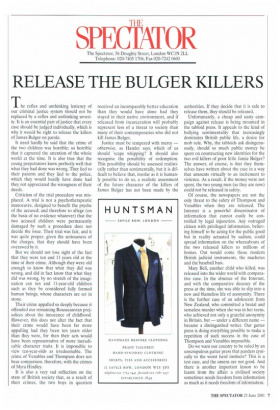RELEASE THE BULGER KILLERS
The reflex and unthinking leniency of our criminal justice system should not be replaced by a reflex and unthinking severity. It is an essential part of justice that every case should be judged individually, which is why it would be right to release the killers of James Bulger on parole.
It need hardly be said that the crime of the two children was horrible; so horrible that it captured the attention of the whole world at the time. It is also true that the young perpetrators knew perfectly well that what they had done was wrong. They lied to their parents and they lied to the police, which they would hardly have done had they not appreciated the wrongness of their deeds.
Criticism of the trial procedure was misplaced. A trial is not a psychotherapeutic manoeuvre, designed to benefit the psyche of the accused; and therefore to allege (on the basis of no evidence whatever) that the two accused children were permanently damaged by such a procedure does not decide the issue. Their trial was fair, and it was quite proper, given the seriousness of the charges, that they should have been overawed by it.
But we should not lose sight of the fact that they were ten and 11 years old at the time of their crime. Although they were old enough to know that what they did was wrong, and did in fact know that what they did was wrong, by no stretch of the imagination can ten and 11-year-old children such as they be considered fully formed human beings, whose characters are set in stone.
Their crime appalled so deeply because it offended our remaining Rousseauvian prejudices about the innocence of childhood. However, this does not alter the fact that their crime would have been far more appalling had they been ten years older than they were, for then their acts would have been representative of more ineradicable character traits. It is impossible to view ten-year-olds as irredeemable. The crime of Venables and Thompson does not bear comparison, therefore, with the crimes of Myra Hindley.
It is also a very sad reflection on the state of British society that, as a result of their crimes, the two boys in question received an incomparably better education than they would have done had they stayed in their native environment, and if released from incarceration will probably represent less of a threat to society than many of their contemporaries who did not kill James Bulger.
Justice must be tempered with mercy — otherwise, as Hamlet says, which of us should 'scape whipping? It should also recognise the possibility of redemption. This possibility should be assessed realistically rather than sentimentally, but it is difficult to believe that, insofar as it is humanly possible to do so, a realistic assessment of the future character of the killers of James Bulger has not been made by the authorities. If they decide that it is safe to release them, they should be released.
Unfortunately, a cheap and nasty campaign against release is being mounted in the tabloid press. It appeals to the kind of bullying sentimentality that increasingly dominates British public life, a desire for mob rule. Why, the tabloids ask disingenuously, should so much public money be spent on constructing new identities for the two evil killers of poor little Jamie Bulger? The answer, of course, is that they themselves have written about the case in a way that amounts virtually to an incitement to violence. As a result, if the money were not spent, the two young men (as they are now) could not be released in safety.
Of course, the newspapers are not the only threat to the safety of Thompson and Venables when they are released. The Internet is a powerful disseminator of information that cannot easily be controlled by legal injunction. Any outraged citizen with privileged information, believing himself to be acting for the public good but in reality actuated by sadism, could spread information on the whereabouts of the two released killers to millions of homes. Out would come those modern British judicial instruments, the machetes and the baseball bats.
Mary Bell, another child who killed, was released into the wider world with comparative ease. In the absence of the Internet, and with the comparative decency of the press at the time, she was able to slip into a new and blameless life of anonymity. There is the further case of an adolescent from New Zealand, who committed a brutal and senseless murder when she was in her teens, who achieved not only a grateful anonymity in Britain, but — under a different name — became a distinguished writer. Our gutter press is doing everything possible to make a repetition of such success in the case of Thompson and Venables impossible.
Do we want our country to be ruled by an unscrupulous gutter press that panders cynically to the worst herd instincts? This is a test case, and the omens are not good. And there is another important lesson to be learnt from the affair: a civilised society sometimes needs freedom from information as much as it needs freedom of information.


































































 Previous page
Previous page